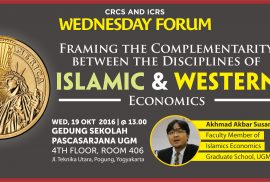Meta Ose Ginting | CRCS | Wednesday Forum Report

Akhmad Akbar Susamto, active lecturer in in the Graduate School of Universitas Gadjah Mada (UGM) started his presentation in Wednesday Forum about Islamic and Western economics by explaining the background behind the academic discipline of Islamic economics. Islamic economics has been developed based on a belief that Islam’s worldview differs from that of Western capitalism. Islamic economics has its own perspectives and values related to how decisions are made. According to Susanto, the boundaries of Islamic economics as a social science or a discipline are closer to economics than to theology or to fiqh.
There is a strong impression telling that Islamic economics is in complete opposition with the Western conventional economics. Susanto argued that such an impression is wrong: although the Islamic worldview does differ from the worldview of Western capitalism, Islamic economics as an academic discipline was established to realize the Islamic worldview and can stand together with conventional economics established in the West. Each can benefit from the other.
Susanto introduced a new framework for Islamic economic analysis that lays a foundation for the complementarity between Islamic and conventional or Western economics. This new framework can resolve the dilemma faced by Muslim economists and help to establish Islamic academic disciplines alongside their Western peers.
This new framework introduced by UGM economists to define the scope and methodology of Islamic economics. It is called the Bulak Sumur framework. The name is taken from the name of the place where UGM is located. Based on the framework, an economy can be considered Islamic as long as it constitutes visions and methods which are consistent with Islamic worldview and it is able to help and guide societies to transform their economy towards the achievement of welfare as Islamic worldview dictates. To be Islamic requires not only separating the sacred and profane but being able to depict both the current state and the ideal state. Thus, the Bulaksumur Framework includes:
Islamic Economics

Abstract
The establishment of Islamic economics as an academic discipline has been motivated by a belief that the Islamic worldview differs from the worldview of Western capitalism. This premise seems to put Islamic economics in total opposition to conventional, or Western, economics. In the coming presentation, the speaker will argue that such an impression is wrong: although the Islamic worldview does differ from the worldview of Western capitalism, Islamic economics as an academic discipline was established to realize the Islamic worldview and can stand together with conventional economics established in the West Arguing that each can benefit from the other. The speaker will introduce a new framework for Islamic economic analysis that lays a foundation for the complementarity between Islamic and conventional or Western economics. This new framework can resolve the dilemma faced by Muslim economists and help to establish Islamic academic disciplines alongside their Western peers.
Speaker
Akhmad Akbar Susamto is a lecturer at the Departemen of Economics and a faculty member at the master program specialize in Islamic Economics, Graduate School, UGM. In additional to conventional [Western] Economics education background, he has a strong interest in Islamic Political Economy, Islamic Economics and Islamic Finance. He earns his bachelor, master’s and PhD degrees in Economics from UGM, Monash University and Australia Nasional University respectively.

